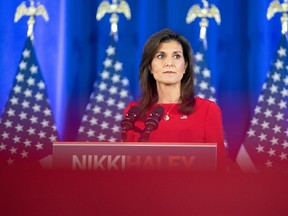We are exactly where we were before: pitting an old, decent president with a strong economy and solid record against an old, indecent former president who practises the politics of rage and revenge.

Article content
There are few surprises in American politics this election year and fewer still after Super Tuesday. On the busiest day of the primary calendar, voters cast ballots in 16 states and changed absolutely nothing in the presidential race.
If you thought Nikki Haley would pull off an upset in many of those states — giving Republicans a last opportunity to rally around her and stop Donald Trump — you’ll be disappointed. Trump won almost everywhere, Haley has withdrawn from the race and Trump is now poised to clinch his party’s nomination within two weeks.
Advertisement 2
Article content
Article content
He is now formally the presumptive nominee, which is what he was last week and has been every week since he won Iowa and New Hampshire. Having dispatched Ron DeSantis (remember him?) early, Trump has now eliminated everyone. He made it look easy.
For the record, Haley won Vermont on Tuesday. It was her second victory after winning Sunday in the District of Columbia (where it is as hard to find a Republican today as it was “to dig up a Democrat in Vermont” in the 1950s, as Danny Kaye quipped in “White Christmas”).
It was only a matter of time before Haley withdrew. If she was waiting for Trump to be found guilty of a felony, she ran out of time. If she was running for 2028 as the “I told you so candidate,” she has now made her point.
She gamely stayed in the race and grew a backbone. She congratulated Trump on Wednesday but pointedly did not endorse him. She cannot bring herself to treat him with the disgust he levels at her (he calls his former ambassador to the United Nations “birdbrain,”) but there she was, in the ring, alone, and there she redeemed herself.
As for Joe Biden, there were no surprises either. He won everywhere, which happens when you have no opponent. He faced some dissent in Minnesota, where the “uncommitted” protest vote over Gaza was 15 per cent or so. It’s a problem for him.
Advertisement 3
Article content
As Trump will be the nominee, so will Biden. The prospect of delegates choosing someone else at the Democratic National Convention in August in Chicago is as unlikely as it is for Republicans to unseat Trump.
So, after Super Tuesday, we are where we were before, as history inexorably unfolds, pitting an old, decent president with a strong economy and solid record against an old, indecent former president who practises the politics of rage and revenge. Ever the sore winner, Trump declared Tuesday that the United States is now “a third world country” which is “dying” and that “communists and fascists” are controlling Biden.
It will be the first rematch of two presidential nominees since Dwight Eisenhower and Adlai Stevenson in 1956, and the first between a former and sitting president since Teddy Roosevelt challenged Howard Taft in 1912. The campaign will be long, vicious and expensive.
The only surprise on Tuesday would have been if Congressman Adam Schiff had not been assured he would be elected to the Senate from California in November, or if Republicans in Texas had not turned on each other with fury. Or if the mercurial Kyrsten Sinema had decided to stay in the race in Arizona. Or if Mitch McConnell had not endorsed Trump, showing, once again, his spirited lack of principle and Trump’s complete takeover of the party.
Advertisement 4
Article content
Surprises to come? It would be a surprise if the Supreme Court did not continue to do what it can to ensure Trump’s election, as it has in its recent rulings. It would be a surprise if Elon Musk did not endorse Trump, but no surprise, in exchange for his lucre, if Trump promises to make him Secretary of State.
It would be a surprise if Congress sent aid to Ukraine. It would be a surprise if the mainstream media talked as much about Trump’s ignorance as about Biden’s age.
Most of all, it would be a surprise if this wasting contest was not the most important since 1860, a choice between autocracy and democracy. If any of this turns out differently, it would be a stunning but welcome surprise — for United States, and the world.
Andrew Cohen is a journalist, a commentator and author of Two Days in June: John F. Kennedy and the 48 Hours That Made History.
Article content



